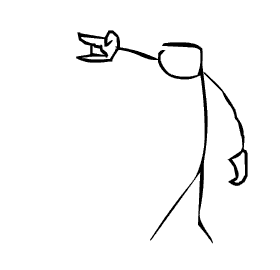That assumes someone has the ear to know when something is off key or out of scale. Its MUCH easier to do this sort of brute-force approach if you at least limit yourself to a proper scale using the “fold” strategy up there. In that case at least you are doing your trial and error approach on keys that belong together and stand a much better chance at ending up with a usable chord that doesn’t muck up your mix.
Gotta say: if listening to predecessors with superior chops is bad for budding musicians, than… hmmmf. We’re in worse shape than I thought.
Because aside from the technical afterthunk descriptives telling us how structurally advanced Tyner’s chords (or whoever) are, there’s the basic visceral fact of how evocative his music is. He builds palaces in the air out of chords that just float over your head exactly like a mansion wouldn’t.
So let the padawan get gassed on crazy chords and fall asleep dreaming of impossible piles of notes that bleed into each other and lift you off the ground…
(channeling my inner BM.)
Fair point, but I don’t think that going out of key is always a bad thing and that it’s more important for chords to sound good than be theoretically well constructed. And to me that strategy is almost like those colouring books with outlined drawings. I wanna draw my own lines.
@ronzlo_, that’s a whole debate in the field of education. Ever sat in a maths lecture and just not gotten anything out of it? I think the same applies to music.
Yeah, I was being a bit facetious. People should listen to master musicians and it would be great if the dubstep crowd did listen to some jazz. I was just alluding to the point that if you don’t know how to build a basic 7th chord, McCoy Tyner’s advanced harmonic theory will not make any sense to you. It still doesn’t make sense to me! He is on some next level shit. That’s why Coltrane played with him.
So, I will just drop this here. I know I’ve discussed this before in other theory threads but they are scattered across two dsf forums.
The two notes that you really need to define a chord is a third and a seventh. The third will tell you whether the chord is major or minor and the seventh will tell you whether the chord is major or dominant.
As you move in the V - I progression, a cadential resolution, thirds become sevenths and sevenths become thirds. I can explain this more later if anyone wishes.
But if you want to learn chords, you should start by learning scales, intervals and key signatures.
Music theory doesn’t need to be scary. It’s just a shared language for musicians to play and talk with each other.
I was wondering, is there a way to maybe program a midi keyboard to illuminate certain keys until I tell them to turn off?
As in, if I want to write in F minor, I can set it so all the notes in F minor are lit up (either manually or create presets?) and I can easily play this scale by looking at my keyboard.
That would be possible with like, a Kontrol style KB and some controller mapping/editing experience.
Alternatively, on the easy side you could use something like the ableton midi scale device on the listening track in your daw to keep all midi input to scale. That wouldnt give you any feedback tho apart that the sound stays the same when you’re on the wrong key.
I think the easiest would be to jsut look up the scale/key from wiki and put little colored stickers down. @Sinnergy
Yeah, a bit less sophisticated though lol.
I’m surprised this isn’t an easy thing to do.
Tbh, just download melodyne and steal other people’s chords.
this is literally all you need if you’re in FL
just get a midi controller and see what sounds nice
The key to good chords is self confidence.
Chords and scales are like edm sub-genres for keys and they have the same restricting mind-emprisonment effects as edm sub-genres on music. Therefore, do not use them, and MAKE MUSIC. Just be free from constraints, sub-genres and chords, and let your creative potential reach its zenith. (Notch the bass up a bit and sprinkle on a bit of Chorus as well)
See I just can’t leave this as the last thing here, because honestly, I appreciate a lot of the things you’ve got to say, but I totally disagree with this.
Scales and chords are not restrictions, they are tools. They come in handy when you’re trying to understand the places one can go and expand on. It allows you the opportunity to understand, not just what notes to play, but why to play them at a given moment. I don’t know, it’s not like when you use scales you’re like forced to do any one particular thing. I see them more as guidelines than restrictions.
Music theory has probably been the most useful thing I’ve learned in my 10+ years of creating music.
You keep on connecting those dots and colouring the spaces between the lines they make, soldier!
Ugh. Right. Sure. I’m the idiot because I want to teach something that’s actually useful.
Your words, not mine.
You know, just like, make music man…
Look I’m not just talking about Western classical theory, I’m talking about all theory, all over the world. I’m fascinated with it, and it has helped where my music goes immensely.
But whatever. Again, I’m the idiot because I think learning things are actually useful.

